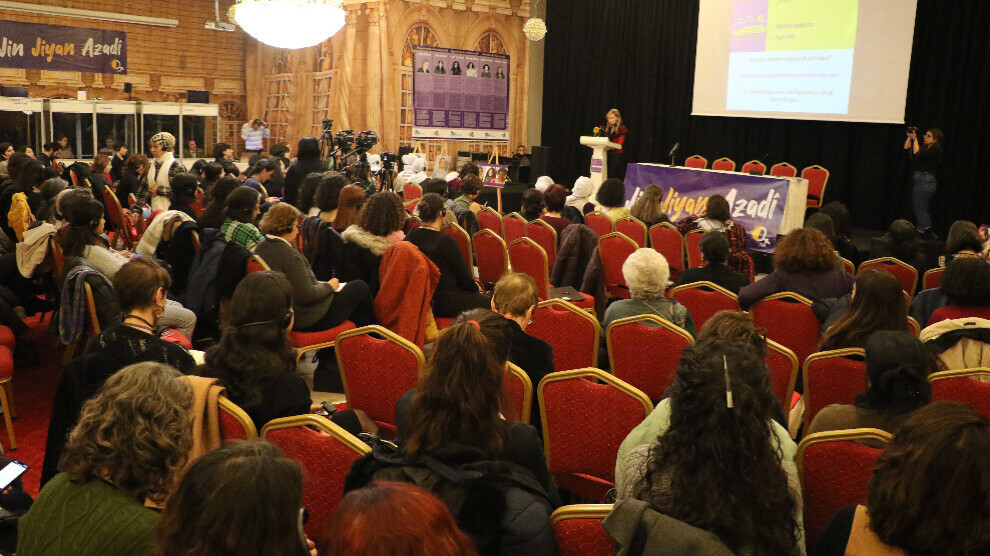Women’s conference 'Chain of Silence' salutes the resistance in prisons
Speaking at the 'Chain of Silence' conference in Amed, TJA activist Hacer Özdemir saluted the resistance of political prisoners in Turkey.
Speaking at the 'Chain of Silence' conference in Amed, TJA activist Hacer Özdemir saluted the resistance of political prisoners in Turkey.

The Free Women's Movement (Tevgera Jinên Azad-TJA) is organising a conference titled 'Chain of Silence: Breaking the Walls Surrounding Women Political Prisoners' in Amed (Diyarbakır). The conference with international participants is being held in a hotel in the central district of Sur.
A banner reading "Towards Freedom with Jin Jiyan Azadi" and photographs of murdered Kurdish women politicians were hung in the hall, and an exhibition of pictures of prisoners was opened.
Democratic Regions Party (DBP) Co-Chair Çiğdem Kılıçgün Uçar, Socialist Refoundation Party (SYKP) Co-Chair Canan Yüce, political party representatives and MPs, feminist activists from different countries, women released from prison, Justice Vigil activists and Peace Mothers, journalists, writers and representatives of civil society organisations are attending the two-day conference.
TJA activist Kader Uzun made the opening speech of the conference. Greeting the participants in many languages, Kader Uzun cited examples of women resisting in prisons and their resistance and stated that women continue to resist everywhere.
Afterwards, TJA activist Hacer Özdemir addressed the conference participants. Hacer Özdemir started her speech by commemorating the women who lost their lives during the resistance in prisons, condemned the isolation of Abdullah Öcalan and his fellow inmates in İmralı Prison and demanded an end to the isolation in Imrali and other prisons as soon as possible.
"The existence, geography, language and culture of the Kurdish people are not recognised," said Hacer Özdemir, noting that Kurds have been struggling for years for the recognition of their existence in the four parts of their country. Özdemir continued, "Kurdish women have been resisting in prisons for this cause for years. You all know about the disaster in Amed Prison after the 12 September coup. There was great resistance there. In this resistance, Mazlum Doğan became the symbol of the Amed Prison and Sakine Cansız and her comrades became the symbol of Kurdish women and the women of the world with the level of their struggle."
Hacer Özdemir remarked that the Kurdish women's participation in the struggle increased as the struggle grew, despite the increase in repression and arrests, and added: "Kurdish women's participation in the revolution also brought about some difficulties. In 1990, our comrades were subjected to the worst torture, harassment and rape. In Kurdish history, dungeons have always been the areas of resistance and a great struggle was waged. We see that there is almost no Kurdish women's movement activist who has not been in prison, or most of the activists are in prison."
Özdemir emphasised that when women were detained in the past, this situation was not welcomed in the society, but women also destroyed such perceptions with their resistance: "In four parts of Kurdistan, great struggle was experienced in dungeons. Leyla Qasim's place is known. While Leyla Qasim was executed, she said: 'Braid my hair, make it a flag of Kurdistan and hang it everywhere. They will execute me, but thousands of Kurds will revolt and hang this flag everywhere'. When Şirin Elemholi was executed, she said; 'I resist as a Kurdish woman. I hope that the Kurdish people will not submit either.’ Although Sakine Cansız was severely tortured in the Amed dungeon, she resisted greatly and did not even sigh in the face of her torturers. In other words, the more arrests and torture there are, the more resistance there is. This resistance continues to spread with the philosophy of Jin, Jiyan, Azadî (Woman, Life, Freedom).”
Özdemir also stated that it is not only Kurdish women who resist in prisons. She said that with this conference they want to create a ground that further unites the women's resistance in prisons and said: "This conference will lead to an increase in relations and sharing and to a common ground for future great work and international work. This will also be very good for international solidarity. Women exist and will exist. We want to be a voice for the resistance and make their voices heard. I hope this conference will be instrumental for this and for international solidarity. We hope that our discussions will reach a conclusion and lead to good results. As Kurdish women, we dedicate this conference to Şirin Elemholi, Leyla Qasim, Sakine Cansız, Sema and their likes. Again, we send greetings to Sabahat Tuncel, Leyla Güven, Figen Yüksekdağ, who are not with us but in cold cells. As a result of the exchange of ideas for two days, the relations to be established here will have an impact on all dungeons. Success will be for women and those who resist in prisons."
After the opening speech, messages from women prisoners were read.